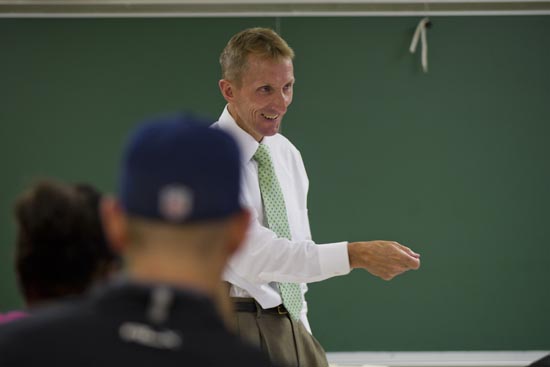Learning from Boston’s Top Cop
BPD Commissioner William Evans teaches summer class

Boston Police Commissioner William Evans is teaching contemporary policing issues for a MET class this summer. Photo by Cydney Scott
Class by class, lecture by lecture, question asked by question answered, an education is built. This is one of a series of articles about visits to one class, on one day, in search of those building blocks at BU.
Should police bust panhandlers for breaking the law? As Boston’s top cop, William Evans can’t answer that question without thinking about Christopher Rogers, who saw a fellow officer gunned down in 1987 by a robber against whom Rogers had held his fire moments before because he feared he’d hit a bystander.
The trauma and his sense of guilt first made Rogers erratic—“Two or three times, I had to call him into my office and literally grab the gun,” said Evans—and then homeless, which he remains. “I still talk to Chris,” said Evans, now Boston’s police commissioner. “It just goes to show you: but for the grace of God…” Rogers’ downfall makes him empathize with homeless panhandlers he sees today: “Every one of those probably had two parents who cared for him.”
This story came not from Commissioner Evans but lecturer Evans, as he addressed 13 students—half of them cops, half civilians—in the Metropolitan College summer class he teaches, Policing in a Democratic Society. He has taught criminal justice classes at BU for a dozen years, and despite Mayor Marty Walsh’s elevating him to the commissioner’s job in January, the 31-year veteran of the police force is devoting six hours a week this summer to the class. (Evans recently won MET’s Roger Deveau Part-Time Faculty Award for Excellence in Teaching.)
With his class running until 9 p.m. on Mondays and Wednesdays, those days are grueling for a man who rises at 4:30 in the morning. But Evans says that he enjoys teaching and the chance it provides him to impart the class’s key lesson: police perform a multi-textured role in a democratic society—not just as enforcers of public security, but as social workers and political scientists balancing the law with individual freedoms.
“I want the students to realize that, number one, we’re not bad guys,” he says. “We’re just like everybody else. We have families to go home to. We don’t like to lock anyone up.…We want to understand the culture people live in and help people deal with their day-to-day problems.” Not that he ducks potentially unflattering police controversies; he says the class discussed the New York man who died recently when an officer apparently used a banned choke hold.
As a lecturer assigning papers rather than patrols, Evans is a natural. The gaunt commissioner—a runner who finished the 2013 Boston Marathon and was one of the first police commanders on site after the bomb blasts—lives up to Boston.com’s description of him as a “quiet, unassuming officer.” He encourages students to share their opinions while offering his in low-key fashion. Still, it’s not everyone who can promise his or her class a field trip to Boston police headquarters.
A recent class sprinted through seemingly every hot-button issue in that day’s headlines to assess the enforcement/rights balance. Do buffer zones around abortion clinics protect women from harassment or infringe upon abortion opponents’ free speech? (In Massachusetts, the latter, the US Supreme Court unanimously decided, invalidating the law.) Should Central American children flooding the United States’ southern border be sent home to extreme violence and deprivation and if not, do we make a mockery of having an enforceable border?
While lawmakers make the laws, “we get caught in the middle” as police, Evans, dressed in an olive-green business suit, white shirt, and green tie, told his students. He cited the security police would provide for some of the overflow of immigrant children that Massachusetts Governor Deval Patrick has promised to house in this state while their status is processed. Patrick says the children would not be released into neighborhoods but would be kept in secure state facilities.
Some students—even one who said he supported immigration—felt that the massive influx would swamp schools, hospitals, and other community services. But Evans empathized with Central American parents wanting better lives for their children. “You’re not talking about [some] sort of animals here,” he said. “I just worry that some of these issues bring out the worst in people.…It’s sort of sad when you think about it. A lot of us have children, [and] you’re looking for a better world, a safer world, for them to have opportunity.” Noting that his grandparents hailed from Ireland, he said that had America banned entry to current citizens’ forebears, “A lot of us wouldn’t be here. I’m not a staunch anti-immigrant.”
Evans arrived at class on the day he testified before the legislature on another cultural flashpoint, the effort to rewrite the state’s buffer zone law. The proposal would allow police to force protesters obstructing clinic access back 25 feet from the facility.
Evans said the approach was “more First Amendment–friendly” than the old law because it would allow protesters’ free speech as long as they didn’t impede women trying to get into the clinic: “You’re being there, but you’ve got to behave.”
Efren Munoz (MET’15) is a captain with Colombia’s national police who is studying for his master’s at BU, with plans to return home. Boston’s “was the first police department created in the United States officially, so they have much experience about how to treat people,” he says in explaining why he took the course. Studying Boston’s successful homicide reduction has especially intrigued him. “Their strategy has been so successful.”
Rebecca Reuss (MET’05) works at Mugar Library, but has a master’s in criminal justice and someday may enter that field. Each Monday, Evans shares Boston’s crime statistics from the previous week, she says, and “it’s been interesting hearing the commissioner’s perspective on how things are going, especially over the July 4th weekend, comparing Boston’s shootings with Chicago,” which suffered a ghastly 80.
Evans isn’t the only law enforcement professional on MET’s faculty roster this summer. Another is James Matesanz, who oversaw several Massachusetts correctional facilities, including Bridgewater State Hospital, a medium-security prison. He is teaching Special Populations in Corrections, a class focusing on whether mentally ill prison inmates could be better handled in other settings.
This Series
Also in
One Class, One Day
-
November 30, 2018
Breaking Bad Director Gives CAS Class the Inside Dope
-
October 31, 2018
Trump and the Press: We’ve Been Here Before
-
August 3, 2018
A Scholarly Take on Superheroes

Comments & Discussion
Boston University moderates comments to facilitate an informed, substantive, civil conversation. Abusive, profane, self-promotional, misleading, incoherent or off-topic comments will be rejected. Moderators are staffed during regular business hours (EST) and can only accept comments written in English. Statistics or facts must include a citation or a link to the citation.